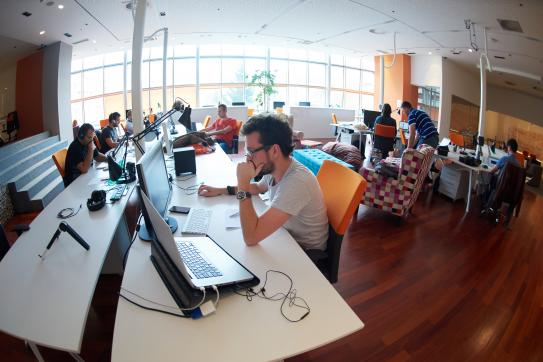Today’s turbulent economy threatens companies of all sizes, but startups, especially early-stage ventures, face unique challenges heading into 2023.
With a recession likely this year, faculty and advisors from the Eugene Lang Entrepreneurship Center say company founders must be focused and disciplined if they seek to secure outside funding, which is less available in down markets. Those who can build a solid foundation and exercise enough patience to wait until the investment climate improves are more likely to survive and thrive beyond this year.
Accomplishing more with less is key. And the payoff can be big, as adversity breeds creativity and innovation. As our experts note, some of today’s most successful companies were born in past recessions.
The following five entrepreneurship experts share some of their insights about the year ahead for startups:
Carly M. Chase, adjunct assistant professor of business, Columbia Business School
Austin Cohen '16, Lang Center advisory board member; founder and CEO, FlexIt Fitness
Robert Delman ’98, Lang Center advisor; managing director, Golden Seeds angel network
Jack McGourty, PhD, adjunct professor of business management, Columbia Business School
Stephanie Palmeri '11, Lang Center advisory board member; partner at NextView Ventures
CBS: How would a recession affect startup venture funding?
Stephanie Palmeri: Capital from angel investors - who are often founders or executives at growth stage startups - will be scarcer than in recent years. So new founders in the beginning stages of startup building and fundraising will need support from early-stage institutional investors to catalyze pre-seed and seed rounds. Angel investors will be more likely to fill out these initial rounds rather than drive them.
Carly Chase: Startups will have to continue to be very disciplined in their expense management and burn rate. They also might want to wait out a new funding round until market conditions improve.
Austin Cohen: A recession would likely give way to innovation through necessity. Countless incredible companies have come out of difficult times, including Microsoft, Mailchimp, and Uber. A recession would surely bring us many new companies with great promise and that, years from now, we will look back on as darlings of difficult times.
Robert Delman: A recession makes investors focus on their existing portfolio companies and save their cash for investment in those companies. The outlook for new investments during a recession is typically not positive.
CBS: What is one key trend for 2023 that entrepreneurs should pay attention to?
Chase: In 2023, we'll see a resurgence of interest in physical startup communities and ecosystems. Yes, we'll continue to see startups take advantage of talent anywhere it is, but founders will engage with their local ecosystems and find value in real-life, physical communities.
Delman: Early-stage investors will continue to reduce risks by investing in companies that have some revenue. According to the “ACA Angel Funders Report,” 70 percent of funded companies last year had revenue.
Cohen: Expect to see acquisitions of small companies by well-capitalized and mainstream players at depressed valuations.
CBS: What digital innovations should founders adopt?
Jack McGourty: Integrating artificial intelligence into knowledge management systems. Founders need to effectively process a voluminous amount of information as they develop and grow their new ventures. For example, AI algorithms can enhance founders' ability to connect the dots across seemingly unrelated knowledge — a game changer for creative problem-solving and a new generation of disruptive innovations.
Chase: To ensure founders take time to step back and consider the big picture and their role in it, they should leverage software that helps them set personal and long-term goals and provides a regular cadence to check in on them.
Cohen: To prioritize profitability, founders should use efficiency management tools that operationalize and streamline finance, marketing, and the like to help them manage their businesses with discipline. Cybersecurity and digital tools to promote employee well-being, development, and retention will also prove very important.
